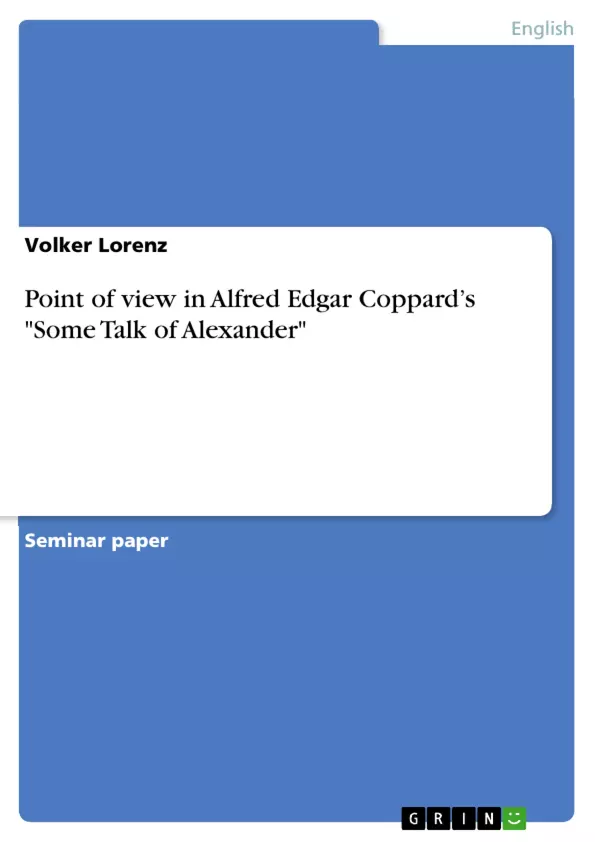“Coppard wrote a handful of the best short stories of the English language and […] contributed significantly to the movement of the short story from being a truncated novel to acquiring its own form”. (Frank Edmund Smith)
Alfred Edgar Coppard’s short stories surely have proven worth a closer examination, and that is why I undertake to delve into one his late works, <Some Talk of Alexander>, written in 1937.
The focus of my work is on the story’s perception, namely on its focalization in general and on the means used to present the main character the way the reader may perceive him.
Inhaltsverzeichnis (Table of Contents)
- 1. Introduction: defining and categorizing ‘point of view’
- 2. The importance of ‘point of view’ in literary analysis
- 3. Alfred Edgar Coppard's short story
- 4. Analysis of Some Talk of Alexander.
- 4.1. Focalization
- 4.2. Directing the reader's sympathy: an onomastic analysis
- 4.3. The use of irony
- 5. Synopsis
- 6. References
Zielsetzung und Themenschwerpunkte (Objectives and Key Themes)
This work examines the concept of "point of view," specifically "focalization," in Alfred Edgar Coppard's short story "Some Talk of Alexander." It analyzes the impact of focalization on the reader's perception of the main character, highlighting the story's narrative techniques and their contribution to the overall effect of the work.
- The concept of "focalization" in literary analysis
- The role of focalization in shaping reader sympathy
- The use of irony as a narrative tool in "Some Talk of Alexander"
- The interplay between character portrayal and focalization
- The influence of focalization on the story's overall effect
Zusammenfassung der Kapitel (Chapter Summaries)
The introduction defines and clarifies the term "point of view," emphasizing the distinction between "narration" and "focalization." Chapter two underscores the significance of "point of view" in literary analysis, explaining its influence on reader perception and sympathy for characters. Chapter three provides an overview of Alfred Edgar Coppard's short story writing, introducing "Some Talk of Alexander" as a focus for further analysis.
The analysis of "Some Talk of Alexander" begins by exploring the story's focalization in Chapter 4.1. Chapter 4.2 delves into the onomastic analysis of the story, examining the role of names in directing reader sympathy. Chapter 4.3 focuses on the use of irony as a narrative tool in the short story.
Schlüsselwörter (Keywords)
The key concepts explored in this work include "point of view," "focalization," "narration," "reader sympathy," "onomastic analysis," "irony," and "Alfred Edgar Coppard." The study centers on the short story "Some Talk of Alexander," analyzing its narrative techniques and the role of focalization in shaping the reader's perception of the main character.
Frequently Asked Questions
What is the main focus of the analysis of "Some Talk of Alexander"?
The work focuses on narrative techniques, specifically focalization and how it shapes the reader's perception of the main character.
What is the difference between narration and focalization?
Narration refers to who is telling the story, while focalization refers to the perspective or "point of view" from which the story's events are perceived.
How does Coppard use irony in this short story?
Irony is used as a narrative tool to distance the reader or create a specific critical perspective on the characters and their actions.
What is onomastic analysis in literary studies?
Onomastic analysis is the study of names within a text and how they are used to direct reader sympathy or convey character traits.
Why is Alfred Edgar Coppard significant for the short story genre?
Coppard is credited with moving the short story away from being a "truncated novel" toward acquiring its own unique literary form.
- Arbeit zitieren
- Volker Lorenz (Autor:in), 2005, Point of view in Alfred Edgar Coppard’s "Some Talk of Alexander", München, GRIN Verlag, https://www.grin.com/document/93553



